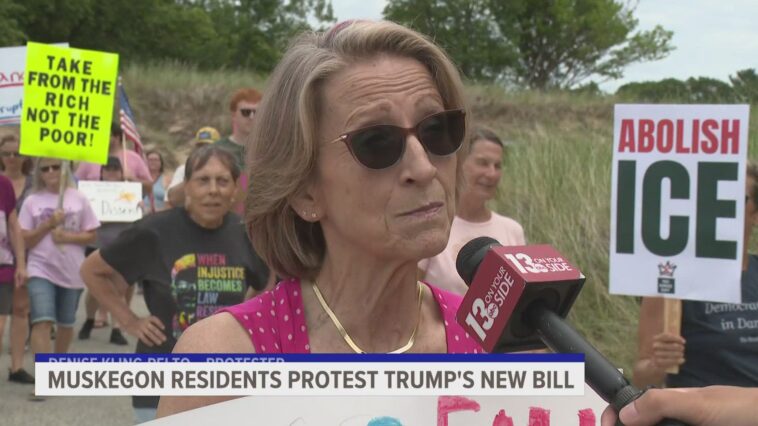Over the weekend in Savannah, a sizable group ranging from 100 to 200 individuals converged at Thomas Square Park. Their mission was to express discontent over the actions of U.S Representative Buddy Carter and to express their opposition to the rule signed into effect by President Donald Trump on July 4, aptly named the ‘Big, Beautiful Bill’. The rally, named ‘The Big Beautiful Backlash’, was organized under the umbrella of Coastal Georgia for Democracy – a local branch of the nationwide Indivisible effort.
Carter, who played a significant role in shaping and introducing the controversial legislation was singled out by Suzanne Moccia, the Director of Communications for Coastal Georgia for Democracy. Moccia voiced her disapproval of Carter’s sponsorship of the new bill, stating, ‘The main objective of this rally is to galvanize the public and make Carter answerable for his actions. We’ve been relentlessly protesting against the Department of Government Efficiency (DOGE) and numerous other mandates from the Trump government.’
Although the newly implemented bill pledges to channel more funds into the hands of a section of the populace by eliminating taxes on their gratuity and overtime payments, the concurrent slashes to many essential budget areas are irrefutable. Programs such as Medicaid and SNAP (Supplemental Nutrition Assistance Program), also known colloquially as Food Stamps, are experiencing notable reductions in funding that are set to disproportionately affect the financial stability of low income families.
Prior to the gathering, Reverend Michael Chaney Jr., Priest-in-Charge at the Episcopal Church of the Epiphany-Savannah made a pronounced statement. He expressed his profound worries over the well-being of children who may face undesirable consequences following the withdrawal of the SNAP benefits. He stated emphatically, ‘It’s a heartbreaking reality to accept that children will not have access to sufficient food.’
‘Think of this,’ implored Chaney, ‘Food banks in District 1 of Georgia are totally exhausted. This situation surpasses political discourse. It fundamentally engages with our morality.’ Tugging at the consciences of his listeners, Chaney called attention to the grim outcomes of the bill’s health care reductions.
The repercussions of the legislation mean that approximately 93,000 inhabitants of Georgia will lose their Medicaid coverage. Furthermore, health insurance premiums for over 1.2 million Georgians are projected to increase. Certain demonstrants vocalized their apprehension over the cascading effects these cuts can potentially trigger, impacting even those not immediately affected.
Specifically, Corey Foreman of the Bryan County Democratic Party emphasized the direct, negative influence these cutbacks can induce. ‘The consequences of these reductions aren’t abstract; they are real and immediate for us,’ stated Foreman. ‘Even though our local hospitals continue to operate today, rural hospitals are progressively shutting down. And those patients? They are likely to flock to the only health facility in Chatham County capable of administering trauma treatment.’
Foreman further amplified his perspective, gracing the importance of realizing the collateral damage these changes could impose on residents of coastal Georgia. ‘But what happens when the demand outweighs the supply?’ queried Foreman. He underscored the direct impact these changes could have on citizens – an indirect, yet very real effect of healthcare cutbacks elsewhere.
Foreman used the rally as an opportunity to invigorate attendees to actively participate in their local political scenes. ‘The aim of this demonstration goes beyond expressing dissent; it serves to inform Georgians about the implications of the new bill, and make them cognizant of their stakes at hand’, declared Foreman. He continued to voice his hopes for the gathering, ‘I anticipate that this protest will enlighten individuals enough to carry this message forward and to keep the conversation going.’
Chaney’s aspirations for the rally are in sync with Foreman’s. He hopes that this public congregation will inspire attendees to cast their ballots in the coming November elections. ‘The imperative now is to endorse policies that favor the vast majority – the 99%’, echoed Chaney. ‘This bill poses a significant threat to our national fabric, our families, and our social support systems, including Medicaid and food assistance.’
The rally also had its fair share of supporters who were not speakers but still felt deeply about the implications of the bill. Megan Kranzler, once such participant, wholeheartedly opposed every facet of the slated legislation. ‘Medical expenses are set to skyrocket and the deficit will balloon into the trillions,’ lamented Kranzler, ‘There isn’t a single element within this bill that could earn my vote.’
Moments such as the rally in Savannah go beyond showcasing solidarity or expressing political dissent – they reflect the heightened state of political discourse and civic engagement in the country. Such initiatives are crucial in empowering citizens and encouraging them to take ownership of their political environments while affecting meaningful change.
As the Savannah chapter of Indivisible, Coastal Georgia for Democracy, continues with these efforts, its members hope that collectively they can generate enough political pressure to reconsider such cuts and protect the vulnerable sections of the society – those adversely affected by policies that cut essential support.
Indeed, as public demonstrations continue, the hope remains that they can educate and inspire action, equipping the public with the knowledge they need to make political decisions in their best interest. The rally, and others like it, serve as reminders of the connection between political awareness and executive decisions, revealing the depth and breadth of the dialogue necessary for a healthy democracy to flourish.

